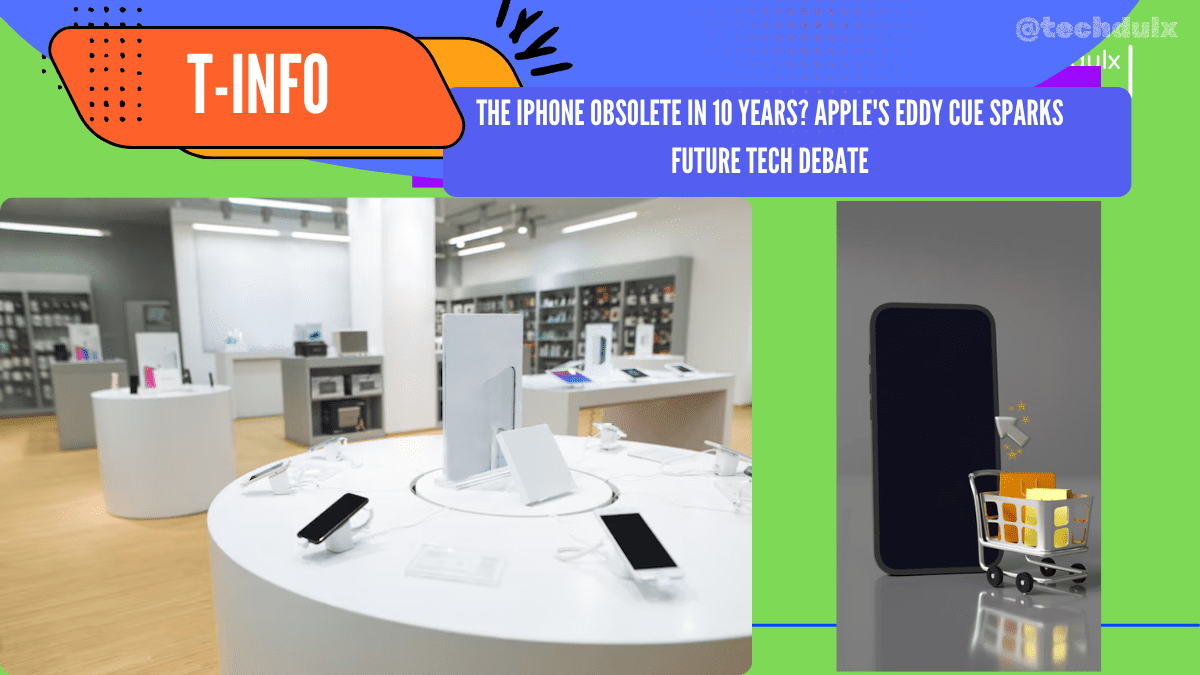In a statement that sent ripples through the tech world, Apple’s Senior Vice President of Services, Eddy Cue, suggested a future where the iconic iPhone might no longer be a necessity. Speaking during the US Department of Justice’s antitrust trial against Google in early May 2025, Cue’s remarks have ignited fresh discussions about Apple’s long-term vision and the transformative power of technologies like Artificial Intelligence (AI).
Is the device that redefined mobile communication really heading towards obsolescence within a decade? Let’s dive into what was said, the context, and what this could mean for the future of personal technology.
Main Highlights: What You Need to Know
- The Core Statement: Eddy Cue testified, “You may not need an iPhone 10 years from now, as crazy as it sounds.”
- The Context: This was said during Google’s antitrust trial, where discussions revolved around technological shifts, competition, and the future of search (particularly with AI’s rise).
- The Catalyst for Change: Cue pointed to major “technology shifts,” specifically highlighting Artificial Intelligence (AI), as the kind of disruption that creates opportunities for new entrants and can reshape established markets.
- Apple’s History of Self-Disruption: Cue referenced Apple’s own history, stating, “One of the best things that Apple did in its history is we killed the iPod… with the iPhone.” This highlights Apple’s willingness to make its own successful products obsolete if a better technology emerges.
- Beyond the iPhone: While not detailing a specific iPhone replacement, Cue’s comments align with Apple’s known investments and explorations into wearables, augmented reality (AR), and potentially AI-driven ambient computing.
Why Would an Apple Exec Say the iPhone’s Days Are Numbered?
It might seem counterintuitive for a top executive of the company that makes the iPhone to predict its potential obsolescence. However, there are several layers to this:
- The Relentless Pace of Innovation: The tech industry, by its very nature, is about constant evolution. What is revolutionary today can become standard tomorrow and outdated the day after. Apple, a leader in innovation, is acutely aware of this.
- Strategic Foresight: Companies like Apple are always looking 5, 10, even 20 years ahead. Publicly acknowledging the potential for massive shifts, even concerning their flagship product, signals that they are not complacent and are actively working on “what’s next.”
- The Rise of AI as a New Interface: Cue specifically mentioned AI. The implication is that future interactions with technology might be less screen-dependent and more intuitive, perhaps relying on advanced AI assistants, wearable tech that seamlessly integrates with our senses, or even brain-computer interfaces (as Elon Musk quickly pointed out with a “Neuralink” comment in response to Cue’s statement).
- Trial Context: While the statement is significant, its delivery during an antitrust trial (focused on Google’s search dominance and Apple’s lucrative deal to feature Google search) might also have served a strategic purpose in portraying a dynamic, ever-changing tech landscape where no incumbent is safe forever.
What Could Replace the iPhone? The Post-Smartphone Era
While Eddy Cue didn’t lay out a specific roadmap for an iPhone successor, his comments, coupled with Apple’s known research and product direction, point towards several possibilities:
- Advanced Wearables & AR Glasses: Apple has been heavily invested in the Apple Watch and recently launched the Vision Pro. The long-term vision for many in the tech industry involves lightweight, all-day wearable AR glasses that could overlay digital information onto the real world, potentially handling many tasks currently done on an iPhone.
- AI-Powered Ambient Computing: Imagine an environment where intelligence is embedded all around you, responding to your needs without requiring you to interact with a specific device. AI would be the orchestrator, understanding context and providing information or services proactively.
- Neural Interfaces: Though more futuristic, companies like Elon Musk’s Neuralink are working on brain-computer interfaces that could, in theory, offer an entirely new paradigm for communication and information access.
Is the iPhone Really Disappearing in 10 Years?
Probably not in its entirety, but its centrality could diminish. Here’s a balanced view:
- Evolution, Not Extinction: It’s more likely that the “iPhone” or the concept of a personal smart device will evolve significantly rather than vanish completely. It might become one of several key personal tech devices, or its form factor could change dramatically.
- AI as an Enhancer First: Before AI entirely replaces the smartphone, it will continue to be deeply integrated into it, making current devices even more powerful and intuitive. Apple is reportedly working on significantly boosting Siri’s capabilities with AI.
- Challenges for Successors: Attempts so far to create mainstream “iPhone-killer” AI gadgets (like the Humane AI Pin or Rabbit R1) have had a lukewarm reception, highlighting the immense challenge of replacing the smartphone’s versatility and established ecosystem.
- Apple’s Ongoing iPhone Development: Despite Cue’s comments, Apple is still heavily investing in the iPhone, with rumors of foldable iPhones and all-screen designs in the coming years. The iPhone remains Apple’s primary revenue driver.
The Impact: A Shifting Tech Landscape
Eddy Cue’s statement is a powerful reminder that the tech landscape is in constant flux. For Apple, it signals a forward-thinking approach, even if it means eventually moving beyond its most profitable product. For consumers, it hints at exciting, and perhaps radically different, ways we might interact with technology in the not-too-distant future.
The Bottom Line: Looking Ahead
While the idea of an iPhone-less world in just ten years might sound “crazy,” as Eddy Cue himself put it, it’s a distinct possibility in the grand scheme of technological evolution. Apple’s success has been built on anticipating and leading such shifts. Whether the iPhone as we know it becomes a relic or transforms into something new, one thing is clear: Apple is already thinking about, and working towards, that future. The journey beyond the smartphone era, with AI at its core, promises to be fascinating.
